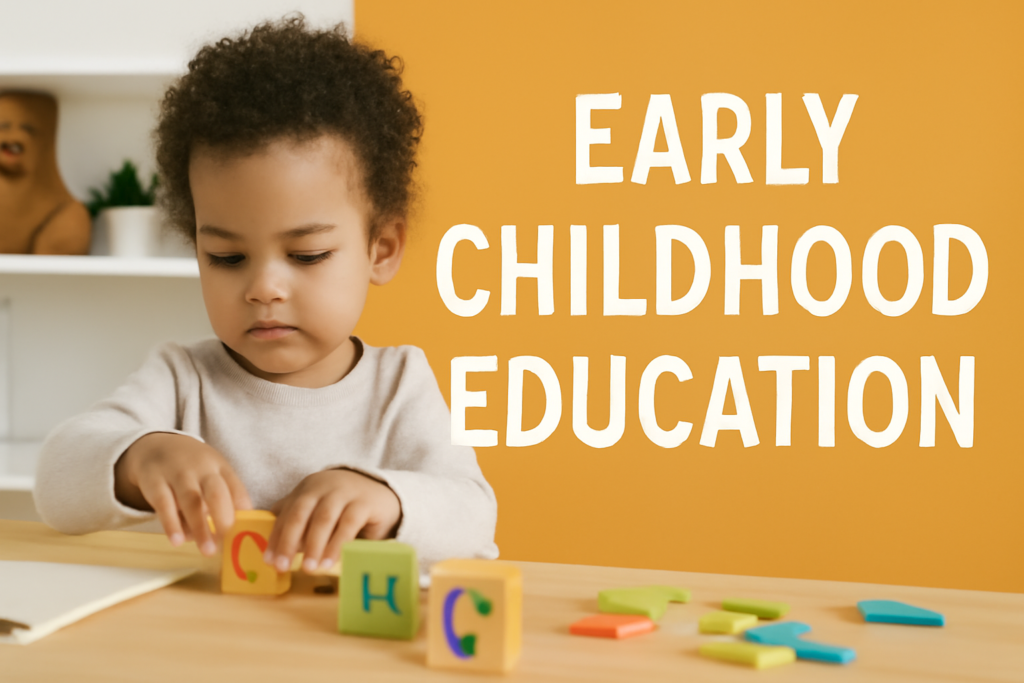Imagine building a house without laying a strong foundation. Even the grandest design would collapse. The same is true for children—early childhood education forms the bedrock of their development. Between the ages of 2 and 6, children experience rapid brain growth, developing essential skills like communication, emotional regulation, problem-solving, and social interaction. These formative years don’t just prepare children for school—they prepare them for life.
Parents today have access to some of the Best International Schools in Electronic City and across Bangalore, where early years education blends play, curiosity, and structured learning. But the real question is: why does early childhood education matter so much? Let’s explore.
Why Early Childhood Education Matters
1. Building Cognitive Skills Early
Research shows that 90% of brain development happens before age 6. Early exposure to numbers, language, and problem-solving activities sparks neural connections that last a lifetime. A child who learns through stories, puzzles, and games is not only absorbing knowledge but also strengthening memory, creativity, and reasoning skills.
2. Emotional and Social Growth
Preschools and kindergartens are children’s first step into the social world beyond family. Through group activities, sharing, and play, children develop empathy, cooperation, and resilience. They also learn to express emotions in healthy ways—an essential skill for future relationships and teamwork.
3. A Safe Space to Explore Curiosity
Young children are naturally curious. Schools that encourage exploration through play-based and inquiry-led methods help children ask questions, experiment, and think critically. This early curiosity often translates into a lifelong love for learning.
The Power of Parental Involvement
While schools play a crucial role, parents remain a child’s first and most influential teachers. The home environment can either strengthen or weaken what children learn in classrooms. Here’s how parents can actively contribute:
- Reading Together: A simple bedtime story strengthens vocabulary, imagination, and bonding. For inspiration, check out the Power of Reading and how it transforms children’s lives.
- Structured Play at Home: Activities like board games, building blocks, or role-play develop problem-solving and social skills.
- Consistent Routines: Setting routines for sleep, meals, and study builds discipline, an essential quality for later academic success. You can also learn more about the Importance of Discipline in shaping responsible learners.
- Positive Reinforcement: Celebrating small achievements builds self-confidence and encourages children to take on challenges without fear.
When parents and teachers work hand in hand, children thrive both academically and emotionally.
Preparing Children for Future Readiness
One of the biggest misconceptions is that early childhood education is only about ABCs and numbers. In reality, these years prepare children for a much bigger journey—future academic, personal, and professional success.
Here’s how early education sets the stage for tomorrow:
- Critical Thinking: Activities like sorting objects, storytelling, and problem-solving games nurture logical reasoning.
- Creativity & Innovation: Exposure to art, music, and imaginative play helps children think beyond the obvious.
- Collaboration: Group play and classroom projects teach children how to work together, resolve conflicts, and respect differences.
- Global Exposure: Many IB schools in Bangalore introduce children to diverse cultures, ideas, and languages early on. This builds adaptability, a skill crucial in today’s interconnected world.
- Confidence for Higher Studies: By the time children transition to primary school, they already have the self-confidence to engage, participate, and take initiative—traits that will serve them well even in higher education.
Future readiness is not about pressuring children to perform; it’s about equipping them with the right mindset and skills to embrace challenges.
Practical Tips for Parents Choosing Early Childhood Education
With so many schooling options available, choosing the right one can feel overwhelming. Here are a few practical tips to guide you:
- Check the Curriculum: Look for schools that balance academics with play-based and experiential learning. Many International Schools in Bannerghatta Road are known for offering such well-rounded programs.
- Teacher-Student Ratio: Small class sizes ensure personalized attention, especially in the early years when children need nurturing guidance.
- Focus on Safety & Infrastructure: Bright, well-ventilated classrooms, safe play areas, and hygienic facilities contribute significantly to a child’s comfort and learning.
- Holistic Development: Beyond academics, check if the school emphasizes extracurriculars like arts, music, and sports. These shape creativity, motor skills, and teamwork.
- Parental Communication: The best schools keep parents actively involved through regular updates, workshops, and open conversations with teachers.
Remember, the best choice is not about brand names or popularity—it’s about finding a school where your child feels safe, encouraged, and excited to learn.
Long-Term Impact of Early Childhood Education
Children who receive quality early education often perform better academically, show higher emotional intelligence, and adapt more easily to life’s challenges. Over time, they develop resilience, leadership qualities, and the confidence to pursue their passions.
In fact, many of the Best International Schools in Electronic City have programs specifically designed to nurture not only academic excellence but also values, empathy, and global citizenship—qualities that go beyond textbooks.
Conclusion
Early childhood education is more than a stepping stone to formal schooling—it’s the foundation of a child’s future. It nurtures the mind, shapes character, and builds lifelong learners. With the right balance of schooling, parental involvement, and future-focused learning, children can grow into confident, curious, and capable individuals.
As parents, your choices today will echo in your child’s tomorrow. By selecting the right environment—whether in an IB, Cambridge, or international setting—you give your child the tools to dream big and achieve even bigger.
FAQs
- At what age should children start early childhood education?
Most children begin preschool between ages 2–3, but it depends on their readiness. - Is play-based learning better than formal methods?
Yes, play-based learning is proven to build creativity, problem-solving, and social skills without adding stress. - How can parents support early education at home?
By reading together, creating routines, engaging in play, and staying connected with teachers. - Does early childhood education really impact the future?
Absolutely. Children exposed to quality early education show stronger academic performance, social skills, and adaptability in later years.

